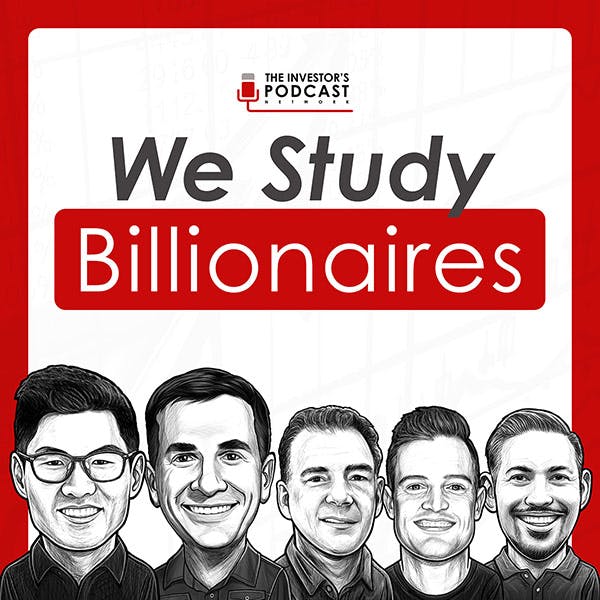
August 11, 2024 • 1hr 6min
TIP651: Value Investing in a Growth-Obsessed Market w/ Scott Barbee
We Study Billionaires - The Investor’s Podcast Network

Key Takeaways
- Deep value investing strategy: Scott Barbee focuses on buying stocks trading at significant discounts to book value, often in out-of-favor industries or companies
- Contrarian approach: Barbee looks for opportunities where other investors are avoiding certain stocks or sectors, allowing him to find undervalued companies
- Risk management: Rather than using volatility as a risk measure, Barbee focuses on permanent capital loss as the true measure of investment risk
- Concentrated portfolio: The Aegis Value Fund takes concentrated positions in a small number of holdings, often focused on particular sectors
- Energy sector focus: Barbee sees strong supply/demand dynamics in the energy sector and believes fossil fuels will remain important for decades to come
- Alignment of interests: Aegis employees and their families have invested $48 million of their own money in the fund alongside outside investors
- Navigating drawdowns: During the 2008 financial crisis, the fund experienced a 72% drawdown but Barbee maintained conviction in the strategy and holdings
- Market outlook: Barbee sees risks in the high valuations of large tech stocks and believes there are opportunities in cheaper, out-of-favor sectors
Introduction
In this episode of We Study Billionaires, host Kyle Grieve interviews Scott Barbee, founder and portfolio manager of the Aegis Value Fund. Barbee discusses his deep value investing approach, which focuses on buying stocks trading at significant discounts to book value. He explains how he has maintained this strategy for over two decades, even as many investors have shifted away from traditional value investing approaches.
Barbee shares insights on his contrarian mindset, risk management philosophy, and views on sectors like energy. He also discusses how he navigated major drawdowns like the 2008 financial crisis and provides his outlook on current market conditions and opportunities.
Topics Discussed
Background and Investing Philosophy (2:39)
Barbee explains how he developed his deep value investing approach:
- Started as a mechanical engineer before getting interested in investing while working at an oil services investment bank
- Became fascinated with value investing and Warren Buffett's approach while in business school
- Worked with and learned from notable value investors like Donald Smith, Irving Kahn, and Bill Ackman early in his career
- Started the Aegis Value Fund in 1998 at age 27, focusing on buying stocks trading at discounts to book value
"I like the grounding or the idea of really determining the fundamental value and owning it at a margin of safety," Barbee says of his value-oriented philosophy.
Maintaining a Value Strategy (8:23)
Barbee discusses how he has maintained his deep value approach even as many investors have shifted to growth and momentum strategies:
- Focuses on owning stocks below intrinsic value rather than speculating on higher prices
- Willing to underperform during periods when value is out of favor
- Sees opportunities when capital flows away from value stocks toward "shiny objects"
- Believes owning undervalued "old economy" stocks provides better risk-adjusted returns
"I empathized with guys like Jean Marlard who would say I'd rather lose half my clients than half my clients' assets," Barbee notes on sticking to his strategy during difficult periods.
Unconventional Approach to Risk and Portfolio Construction (12:13)
Barbee outlines some key aspects of his unconventional investing approach:
- Does not rely on volatility as a risk measure - Focuses on permanent capital loss as true risk
- Willing to concentrate in sectors and small number of holdings - Takes large positions in highest conviction ideas
- Does not manage to avoid index tracking error - Unconcerned with short-term relative performance
- Three key risk factors: High valuation multiples, excessive leverage, and fundamental business risk
"We're much more thinking of the true risks that occur in a situation are risks that really impair long term value," Barbee explains.
Contrarian Mindset and Approach (16:35)
Barbee discusses his contrarian investing style:
- Describes himself as a "genetic contrarian" but tries to recognize when the crowd may be correct
- Looks for opportunities in unloved sectors and companies that other investors are avoiding
- Uses low price-to-book and other value metrics to find potentially undervalued stocks
- Willing to invest in companies and countries facing significant uncertainty if the potential returns are high enough
He cites gold miner Orezone as an example of a contrarian investment in a challenging jurisdiction that offers compelling risk/reward.
Energy Sector Outlook (28:32)
Barbee shares his bullish view on the energy sector:
- Believes supply growth from U.S. shale is slowing while global demand continues to rise
- Sees strong long-term demand from developing countries like China and India
- Thinks fossil fuels will remain critical for decades despite push for renewables
- Finds attractive valuations in energy stocks that have been sold off due to ESG concerns
"I like the underlying demand dynamics. And then on top of it, within the energy space, there was an awful lot of companies that were being disposed of from pools of money that had chosen to manage the money based on metrics other than maximizing risk adjusted return," Barbee explains.
Quality vs. Value (40:10)
Barbee discusses his views on quality vs. deep value investing:
- Recognizes appeal of high-quality businesses but believes they are currently overpriced
- Prefers cyclical stocks with more volatile earnings that are trading cheaply
- Thinks many "quality" companies have taken on too much debt in recent years
- Willing to look at lower quality businesses if the price and potential returns are attractive enough
"I prefer to stick with some of these other companies that might be perceived as lower quality with more volatile earning streams because I think in many cases, these companies have reduced financial leverage pretty significantly over the last several years," Barbee notes.
Portfolio Management and Selling Discipline (43:31)
Barbee outlines his approach to managing positions and selling:
- Will sell when a stock reaches intrinsic value or market-based multiple
- Willing to hold cash rather than stay fully invested
- May sell an undervalued stock to buy an even more undervalued opportunity
- Will reassess and potentially exit if new information contradicts original thesis
- Tries to avoid behavioral biases that can lead to holding losers too long
"I keep trying to remind myself you don't have to make your money back where you lost it," Barbee says of his selling discipline.
Alignment of Interests (46:05)
Barbee discusses how the fund aligns interests with investors:
- Aegis employees and families have $48 million invested in the fund
- Barbee has the majority of his personal wealth in the fund
- Does not require employees to invest but many choose to over time
Navigating the 2008 Financial Crisis (51:09)
Barbee recounts how he dealt with the fund's 72% drawdown in 2008-2009:
- Extremely stressful period personally and professionally
- Maintained conviction that underlying companies would recover
- Many holdings were trading below cash value or at extreme discounts
- Biggest stress was losing clients and assets under management
- Fund rebounded 91% in 2009 after the drawdown
"These companies were trading at valuation levels. When you sat down and you looked at the valuations, they were absurdly cheap," Barbee recalls of the crisis period.
Current Market Outlook (55:47)
Barbee shares his views on current market conditions:
- Concerned about high valuations of large tech stocks, even with higher interest rates
- Sees parallels to 1999-2000 tech bubble in concentration of market gains
- Believes there are bottlenecks that could limit growth of AI and chip companies
- Sees opportunities in cheaper, out-of-favor sectors as money has flowed to tech
- Advises investors who have benefited from tech rally to consider rotating to value
"I think there's some real risk in that sector of the market. I think for those who have been fortunate enough to have played in that know, I think it would pay to remember what Sir John Templeton said, that it always pays to change a winning game," Barbee cautions.
Conclusion
Scott Barbee provides a masterclass in deep value investing, explaining how he has maintained his contrarian approach focused on buying undervalued, out-of-favor stocks for over two decades. He offers insights on risk management, navigating drawdowns, and finding opportunities in sectors like energy that other investors are avoiding. Barbee's disciplined, long-term oriented strategy stands in stark contrast to the growth and momentum approaches that have dominated in recent years. His views on current market conditions and the risks in high-flying tech stocks offer food for thought for investors considering how to position their portfolios going forward.









